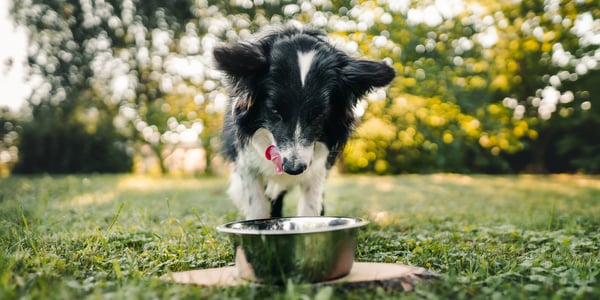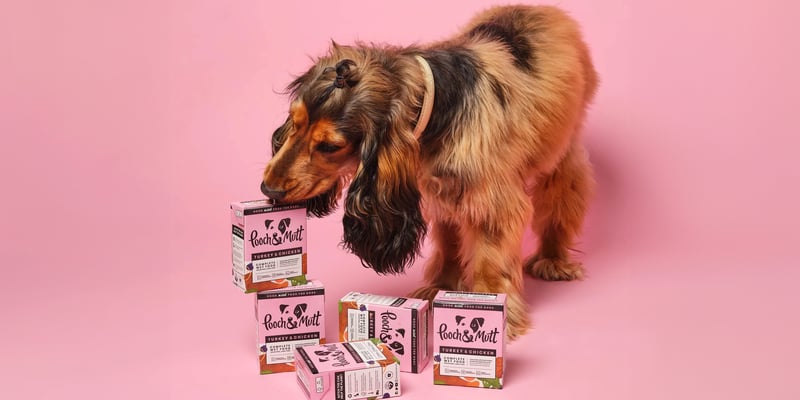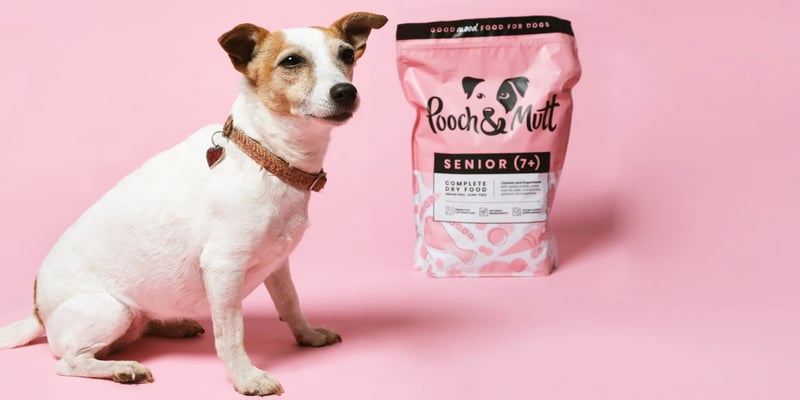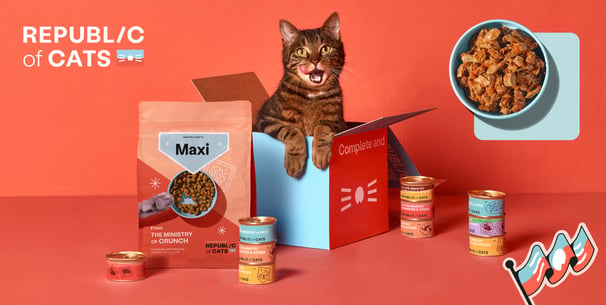Grain-Free Dog Food: The Guide to Nutrition for Your Pup
Index:



Introduction
Welcome to our comprehensive guide on grain-free dog food and its vital role in providing optimal nutrition for your furry friend. Providing high-quality nutrition is essential for your pup's well-being.
A balanced diet contributes to a shiny coat, strong muscles, and improved digestion. By opting for grain-free dog food, you can ensure that your pup receives the essential nutrients it needs, without any potentially harmful grains.
We will also discuss how to transition your pup to a grain-free food regime seamlessly, ensuring a stress-free experience for both of you.
Are you ready to dive into the world of grain-free dog food and discover how it can improve your pup's nutrition? Let's get started! If you're looking for more puppy-related grain-free foods, see our comprehensive info on Grain-Free Puppy Food: The Ultimate Guide.
Key takeaways:
Grain-free dog food provides optimal nutrition for your pup.
It offers various benefits, such as improved overall health and vitality.
A balanced diet contributes to a shiny coat, strong muscles, and improved digestion.
Transitioning to a grain-free diet can be done seamlessly with the right approach.
Choosing the best grain-free dog food involves considering your dog's specific needs.
Understanding grain-free dog food and its benefits



In this section, we will explore the concept of grain-free dog food and its numerous benefits for our furry friends. Grain-free dog food is a type of dog food that does not contain any grains such as wheat, corn, or soy.
Instead, it is formulated with alternative ingredients that provide the necessary nutrition for dogs without the use of grains.
What makes dog food grain-free?
Grain-free dog food is formulated without grains and instead uses alternative ingredients such as sweet potatoes, lentils, and peas as a source of carbohydrates. These ingredients not only provide energy but also offer various nutritional benefits for dogs. Grain-free dog food also often contains a higher percentage of animal-based proteins, which are essential for their growth and development.
The perceived health benefits for dogs with sensitive stomachs
One of the significant benefits of grain-free dog food is its positive impact on dogs with sensitive stomachs. Many dogs struggle with digestive issues when consuming grains, leading to symptoms such as gas, bloating, and diarrhoea.
By eliminating grains from their diet, dogs with sensitive stomachs can experience reduced digestive issues and improved overall well-being. Grain-free dog food can help alleviate their discomfort and allow them to enjoy their meals without any digestive disruptions.
Learn more about The Benefits of Dog Supplements for additional insights into optimising your dog's health.
Assessing the impact on your pup's health and vitality
Another crucial aspect to consider is the potential impact of grain-free food on your dog's health and vitality.
Advocates of grain-free dog food claim that it can enhance a dog's overall health and well-being. Some potential benefits include increased energy levels, improved coat condition, better dental health, and enhanced immune function.
While there may be anecdotal evidence supporting these claims, it's essential to consider any scientific evidence or studies that provide further insights into the effects of grain-free dog food on a dog's health and vitality.
Now that we have a better understanding of grain-free dog food and its benefits, let's delve deeper into the importance of meat content in grain-free dog food in Section 3.
If you're wondering whether dogs can eat certain human foods like cucumbers, check out our article Can Dogs Eat Cucumbers? for more information.
Additionally, if you're curious about other aspects of your dog's health, such as why their noses are wet, we have an informative article on that topic too.
The importance of meat content in grain-free dog food
The significance of meat content in grain-free dog food and its importance in providing optimal nutrition for your canine companion is generally very important.
Understanding the sources of protein in grain-free diets, the role of meat protein in your dog's diet, and how to identify high-quality meat ingredients is key to ensuring your pup receives the nutrition they need for optimal health and well-being.
Although recent studies on vegan dog diets show some health benefits, meat protein is considered the most bioavailable and easily digestible in both humans and dogs.
For those considering a vegan diet for their dogs, our article on vegan dog food discusses its pros and cons.
Examining sources of protein in grain-free diets
Grain-free diets offer a wide range of protein sources for your dog, both from animal and plant-based options.
These protein sources provide essential amino acids necessary for muscle development, tissue repair, and overall health.
Animal-based protein sources typically include meats such as chicken, beef, turkey, and salmon. Plant-based protein sources can include lentils, peas, and sweet potatoes.
By incorporating a variety of protein sources in your dog's diet, you can ensure they receive a well-rounded mix of essential nutrients. This variety can also help prevent potential protein sensitivities or allergies and accommodate dogs with dietary restrictions.
The role of meat protein in your dog's diet
Meat protein plays a crucial role in supporting your dog's overall health and vitality. Dogs are primarily carnivorous animals, and their bodies are designed to digest and metabolise meat efficiently.
Meat protein provides essential amino acids, vitamins, and minerals necessary for maintaining muscle mass, supporting immune function, and promoting healthy skin and coat.
Feeding your dog a diet rich in meat protein can contribute to their overall well-being, energy levels, and longevity.
High-quality meat ingredients are easily digestible and suitable for dogs of all ages and sizes, ensuring they receive the necessary nourishment for optimal growth and development.



Identifying high-quality meat ingredients
When selecting grain-free dog food, it is essential to identify high-quality meat ingredients to ensure your pup receives the best nutrition. Here are some factors to consider:
1. Source: Look for dog food that specifies the type of meat used, such as "real chicken" or "premium beef." It's best to choose dog food brands that use high-quality sources of meat protein.
2. Meat content: Check the meat content listed on the dog food packaging. Look for options that have a high percentage of meat content, indicating a more substantial protein source.
3. No fillers: Avoid dog food that includes fillers such as corn, wheat, or soy, as these can detract from the overall meat content and nutritional value.
4. Natural ingredients: Opt for dog food that uses natural ingredients and avoids artificial preservatives, colours, and flavours. These may compromise the quality of the meat ingredients.
By carefully examining the meat content and ingredient quality, you can ensure that your dog receives a grain-free diet that is rich in high-quality meat ingredients, promoting their health and well-being.
Benefits of meat protein in grain-free food:
Provides essential amino acids for muscle development
Supports immune function
Promotes healthy skin and coat
Why choose high-quality ingredients?
Better digestibility and nutrient absorption
Minimises the risk of food allergies or sensitivities
Ensures optimal growth and development
What replaces grains in grain-free dog food?



As pet owners become increasingly conscious of their dog's dietary needs, grain-free dog food has gained popularity.
But what exactly replaces the grains in these specialised diets? This section explores the alternative ingredients commonly used in grain-free dog food and their benefits.
1. Sweet potatoes: These nutrient-rich tubers are a popular substitute for grains in dog food. They are high in fibre, vitamins, and minerals, providing essential nutrients for your furry friend's overall health.
2. Lentils: Another excellent alternative ingredient, lentils are a great source of plant-based protein as well as fibre. They offer a nutritional boost to grain-free dog food formulas, promoting muscle development and a healthy digestive system.
3. Peas: Peas are often used in grain-free dog food as an alternative source of carbohydrates. They are packed with nutrients, including vitamins and antioxidants, and can help support your dog's energy levels.
These alternative ingredients play a crucial role in creating a balanced and nutritious diet for dogs. They offer a range of benefits, including improved digestion, increased energy, and enhanced overall well-being. When choosing grain-free dog food for your pet, be sure to consider the specific benefits that these alternative ingredients provide.
Navigating the dry dog food market: a buyer’s guide
Choosing the right dry dog food is essential for your furry friend's health and well-being. With so many options available in the dry dog food market, it can be overwhelming to make the best choice.
This buyer's guide will help you navigate through the wide variety of grain-free options and provide valuable insights to consider when selecting dry dog food for your pup.
Factors to consider when choosing grain-free dog food
When searching for grain-free dog food, there are several factors to take into account:
Ingredients: Look for high-quality, natural ingredients that provide essential nutrients and support your dog's overall health.
Meat quality: Opt for dry dog food brands that use the finest quality meat as the main protein source. This ensures your pup receives the necessary amino acids for muscle development and optimal nutrition.
Brand reputation: Consider reputable brands that have a history of producing nutritious and safe dog food. Look for brands that prioritise transparency and quality control in their manufacturing process.
Grain-free dog food diet and nutritional balance



In order to provide optimal nutrition for your pup, it is crucial to maintain a proper balance in their grain-free dog food diet. This section will explore the importance of nutritional balance and guide you on how to achieve it.
Understanding dry matter label analysis for balanced meals
When selecting grain-free dog food, it is essential to understand the concept of dry matter label analysis. This analysis allows you to determine the actual nutrient composition of the food without the moisture content.
By examining the percentages of protein, fat, and carbohydrates in the dry matter, you can ensure that your pup's meals are properly balanced.
By referring to the dry matter label analysis, you can assess the protein content and ensure that it meets your pup's dietary needs. Understanding the percentage of fat and carbohydrates can help you maintain a balanced diet that supports your dog's energy levels and overall health.
How to transition your pup to a grain-free food regime
Transitioning your pup to a grain-free food regime requires a gradual process to minimise digestive upset. Follow these steps to successfully transition your furry friend:
1. Start by mixing a small amount of the new grain-free food with your dog's current food.
2. Gradually increase the proportion of the new food over a period of 7-10 days.
3. Observe your dog's response to the new food and make any necessary adjustments.
During the transition, be mindful of any changes in your dog's stool consistency or appetite. If you notice any persistent issues, consult your veterinarian for guidance.
Remember, every dog is unique, and their transition to a grain-free diet may vary. Patience is key in ensuring a successful switch that benefits your pup's health and well-being.
The best grain-free dog foods: our top picks



There are several buying options and companies which offer an exceptional grain-free option when it comes to dog food.
From wet, to dry food and foods containing various types of meat, we will present our top picks for the best grain-free dog foods available in the market.
When selecting our recommendations, we consider various factors to ensure that you are providing your furry friend with the highest quality nutrition. Our evaluation includes brand reputation, ingredients, meat quality, and overall nutritional value.
Finding the ideal solution for different breed sizes and types
We understand that every dog is unique, and their dietary needs may vary based on their breed size and type.
Therefore, we have selected grain-free dog foods that cater specifically to different dogs, from various sizes and ages, to breeds. Whether you have a Chihuahua or a Great Dane, our top picks of complete dog foods offer tailored nutrition to support your dog's optimal health and well-being.
Exceptional protein-rich options for adult dogs
Protein is essential for your adult dog's overall health and muscle development. Our top picks for grain-free dog foods emphasise exceptional protein-rich options.
These formulas provide the perfect balance of high-quality proteins from sources such as chicken, beef, turkey, and fish. With these protein-packed choices, your adult dog can maintain a healthy and active lifestyle.
Pooch & Mutt Grain-Free Dog Food:



Pooch & Mutt offer a variety of grain-free dog foods, including both dry and wet options suitable for different life stages of dogs like puppies and adults. The products available cater to specific needs like calm and relaxed, health and digestion, as well as tailored options for puppies, small dogs, seniors, and those requiring joint care or skin and coat support.
The website provides detailed information on each product, ensuring customers can make informed choices based on their dog's specific dietary needs and preferences. You can explore their full range and get more details on their website: Pooch & Mutt.
Primal High Meat Dry Food



This grain-free, high-protein dog food is made with 80% ostrich, lamb, chicken, and salmon, and is enhanced with natural superfoods like turmeric and spirulina. It's designed to replicate the ancestral diet of dogs, providing energy and amino acids for muscle maintenance. It also contains glucosamine and chondroitin for joint health. Suitable for dogs from 8 weeks old, it's free from grains and packed with natural ingredients for optimal health.
Complete Functional Puppy Superfoods



This grain-free, chicken and superfood blend is specifically formulated for puppies. It's packed with lean protein and grain-free goodness from real ingredients that are gentle on the tummy. The recipe includes salmon oil, kale, spinach, and berries, providing vitamins, fatty acids, and antioxidants. It's designed to support a healthy, happy puppy and is free from wheat, corn, rice, beef, soya, or dairy products.
Turkey & Chicken Wet Food



A nutritious blend of lean turkey and chicken, this wet food is enriched with fruits and vegetables like blueberries and apples, offering antioxidants and fibre. It's grain-free, free from artificial additives, and made with locally sourced ingredients. Ideal for dogs of all ages, it supports immune health and digestion, and comes in environmentally friendly, recyclable packaging.
Senior Complete Superfood



This grain-free, chicken and superfood blend is tailored for senior dogs. It includes highly digestible protein, omega-3 fatty acids, and glucosamine for joint protection, as well as chamomile for its calming effect. The recipe is palatable for dogs with diminished sense of smell and taste, ensuring they get the necessary nutrients for a healthy life. It's formulated without wheat, corn, rice, beef, soya, or dairy products.
Health & Digestion Complete Wet Food



This wet food is designed for dogs with sensitive stomachs, featuring turkey and herring as hypoallergenic protein sources. It includes prebiotics for gut health and hemp for maintaining low-stress levels. Suitable for all breeds as a food topper or as a complete food for smaller breeds from 12 weeks old, it's grain-free and packed with natural ingredients to support digestive health and overall wellness.
Conclusion
After exploring the world of grain-free dog food and its many benefits, it's important to evaluate whether it's the right choice for your furry friend. When making this decision, consider factors such as your dog's health issues, dietary preferences, and overall lifestyle.
While grain-free diets can be beneficial for dogs with specific sensitivities or digestive issues, it's essential to consult with your veterinarian before making any significant dietary changes.
Maintaining a healthy weight and lifestyle is crucial for your dog's well-being, and grain-free options can play a role in achieving this.
By carefully selecting high-quality grain-free dog food and monitoring portion sizes, you can help your pup maintain a healthy weight and prevent obesity-related health problems. However, it's important to remember that a balanced diet, regular exercise, and veterinary care are all key components of a healthy lifestyle for your four-legged companion.
FAQs
What makes dog food grain-free?
Grain-free dog food does not contain any grains such as wheat, corn, or soy. Instead, it uses alternative ingredients like sweet potatoes, lentils, and peas as sources of carbohydrates.
Are there any health benefits to grain-free diets for dogs with sensitive stomachs?
Yes, many dogs with sensitive stomachs experience improved digestion and reduced gastrointestinal issues when switched to a grain-free diet. Grain-free options often use easily digestible animal protein sources like chicken meal or salmon meal.
How does grain-free dog food impact my dog's health and vitality?
Grain-free dog food can contribute to improved overall health and vitality for many dogs. It can provide a balanced meal with high-quality, digestible animal protein sources that support muscle development and optimal energy levels.
Where does the meat protein in grain-free dog food come from?
Meat protein in grain-free dog food can come from various sources such as beef, chicken, turkey, and fish like salmon. Look for products that mention high-quality meats, including muscle meat, beef organs, and fresh beef, as these indicate a higher meat content.
What are the alternative ingredients used to replace grains in grain-free dog food?
Grain-free dog food uses alternative ingredients like sweet potatoes, lentils, and peas as sources of carbohydrates and fibre. These ingredients provide essential nutrients and contribute to a balanced and nutritious diet for dogs.
How do I choose the best grain-free dog food in the dry dog food market?
When choosing grain-free dog food, consider factors such as ingredients, meat quality, and brand reputation. Look for products that contain high-quality meats and avoid fillers or artificial additives. Don’t forget to consider your budget and the specific needs of your dog.
Are there protein sources in grain-free dog food beyond chicken and beef?
Yes, grain-free dog food offers a variety of protein sources beyond chicken and beef. Some alternatives include turkey, fish like salmon, and even organ meats like beef liver and beef heart. These options provide a diverse range of nutrients for your dog.
How can I ensure a balanced diet in a grain-free dog food regime?
To ensure a balanced diet, it's important to understand dry matter label analysis, which helps determine the nutrient composition of the food. Look for dog foods that include all essential nutrients, vitamins, and minerals to provide a complete diet for your pup. Consult with your veterinarian for specific nutritional recommendations.
How do I transition my dog to a grain-free food regime?
To transition your dog to a grain-free food regime, introduce the new food gradually by mixing it with the current food. Start with a small amount of the grain-free food and gradually increase the ratio over several days. This will give your dog's digestive system time to adjust to the new diet.
What are the recommended grain-free dog food options for different breed sizes and types?
The best grain-free dog food will depend on your dog's specific breed size and type. Look for options tailored to different age groups, such as puppy, adult, or senior formulas. Some brands also offer specialised formulas for large breed dogs or small breed dogs, considering their unique nutritional needs.
What are some exceptional protein-rich options for adult dogs in grain-free dog foods?
Grain-free dog foods often offer exceptional protein-rich options for adult dogs. Look for products with high meat content, such as those made with real chicken, turkey, or salmon. These options provide the essential amino acids and nutrients necessary to support your adult dog's health and well-being.
Are there grain-free dog food options available for dogs with specific nutritional needs?
Yes, many grain-free dog food brands offer options tailored to meet specific nutritional needs. For example, there are grain-free formulas designed for weight management or for dogs with allergies or food sensitivities. These specialised options can provide the necessary nutrition while addressing specific health concerns.
Is a grain-free diet suitable for all dogs?
While grain-free diets can be beneficial for many dogs, it's important to consult with your veterinarian before making any dietary changes. Some dogs may have specific dietary requirements or allergies that need to be considered. Your vet will be able to recommend the best diet for your furry friend.
How does a grain-free diet help in maintaining a healthy weight and lifestyle?
Grain-free diets can contribute to maintaining a healthy weight by providing a balanced mix of protein, healthy fats, and carbohydrates from alternative sources. These diets can help prevent obesity and promote a healthier, more active lifestyle for your dog.
Any final thoughts or recommendations when considering a grain-free dog food diet?
When considering a grain-free dog food diet, it's important to evaluate your dog's individual needs and consult with your veterinarian. Consider factors such as the brand's reputation, ingredients, and meat quality.
Remember that a balanced diet, appropriate portion sizes, and regular exercise are key to providing your pup with a healthy life.
Curious about what else your dog can or cannot eat, such as white chocolate? Check out our article for detailed information.
Waggel Pet Insurance
Need more help? You're in luck if you're a Waggel Pet Insurance member. Along with our excellent coverage, we offer access to a 24/7 online vet to answer all your sticky questions, especially if you need grooming assistance.
Not a member? Why not get a quote now and cover your furry friend for a range of illnesses, all while enjoying our amazing perks and rewards.
Want more like this?
Get updates from us with helpful info, advice, answers to frequently asked questions and much more.
Index:
- Introduction
- Understanding grain-free dog food and its benefits
- The importance of meat content in grain-free dog food
- What replaces grains in grain-free dog food?
- Navigating the dry dog food market: a buyer’s guide
- Grain-free dog food diet and nutritional balance
- The best grain-free dog foods: our top picks
- Pooch & Mutt Grain-Free Dog Food:
- Conclusion
- FAQs
Related posts:
Get your quote
Along with our excellent coverage, we offer access to a 24/7 online vet to answer all your sticky questions.





